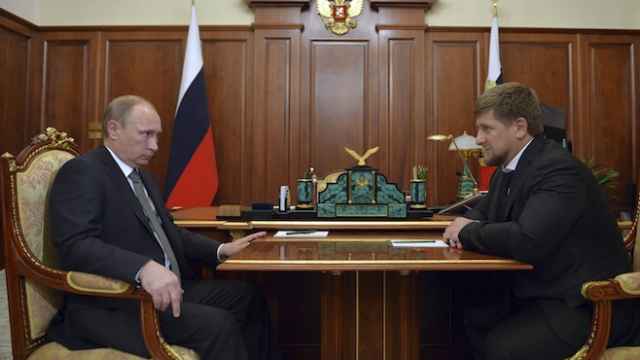Days after Chechen leader Ramzan Kadyrov called for the homes of Islamic militants' families to be razed to the ground following a large-scale attack on Grozny, unidentified individuals in masks descended on a small village with ties to the militants and set four homes on fire, a news report said Tuesday.
Residents of the village of Yandi told news site Slon.ru that more than a dozen cars pulled in late Monday night carrying masked men who spoke in both Russian and Chechen before setting fire to several houses.
"At first we thought they had come to conduct searches, but these people just started pouring gasoline on the house. They held us. They wouldn't let us get anything [from the house] or put out the fire," said one resident who spoke to Slon.ru on condition of anonymity.
Several other witnesses offered similar descriptions of events, saying masked men burst into their yards, broke their windows and then set their homes on fire from the inside.
"We were so scared that our house would burn down as well that we spent the night outside," another resident said in comments to Slon.
The families of several suspected militants live in the village of Yandi, according to Slon, but not all of them were involved in the Dec. 4 attack on Grozny. Some are simply thought to have "gone to the forest," a euphemism for joining the republic's underground insurgency.
On Friday, a day after 14 policemen were killed during an attack on Grozny, Kadyrov took to his Instagram page to encourage making family members of militants liable for terrorist attacks.
"I officially declare that the time when parents don't answer for the actions of their sons or daughters has ended. … If a militant in Chechnya murders a policeman or another person, the family of the militant will immediately be deported from Chechnya without the right to return, and their home will be torn down to the ground," Kadyrov wrote.
Contact the author at [email protected]
A Message from The Moscow Times:
Dear readers,
We are facing unprecedented challenges. Russia's Prosecutor General's Office has designated The Moscow Times as an "undesirable" organization, criminalizing our work and putting our staff at risk of prosecution. This follows our earlier unjust labeling as a "foreign agent."
These actions are direct attempts to silence independent journalism in Russia. The authorities claim our work "discredits the decisions of the Russian leadership." We see things differently: we strive to provide accurate, unbiased reporting on Russia.
We, the journalists of The Moscow Times, refuse to be silenced. But to continue our work, we need your help.
Your support, no matter how small, makes a world of difference. If you can, please support us monthly starting from just $2. It's quick to set up, and every contribution makes a significant impact.
By supporting The Moscow Times, you're defending open, independent journalism in the face of repression. Thank you for standing with us.
Remind me later.





